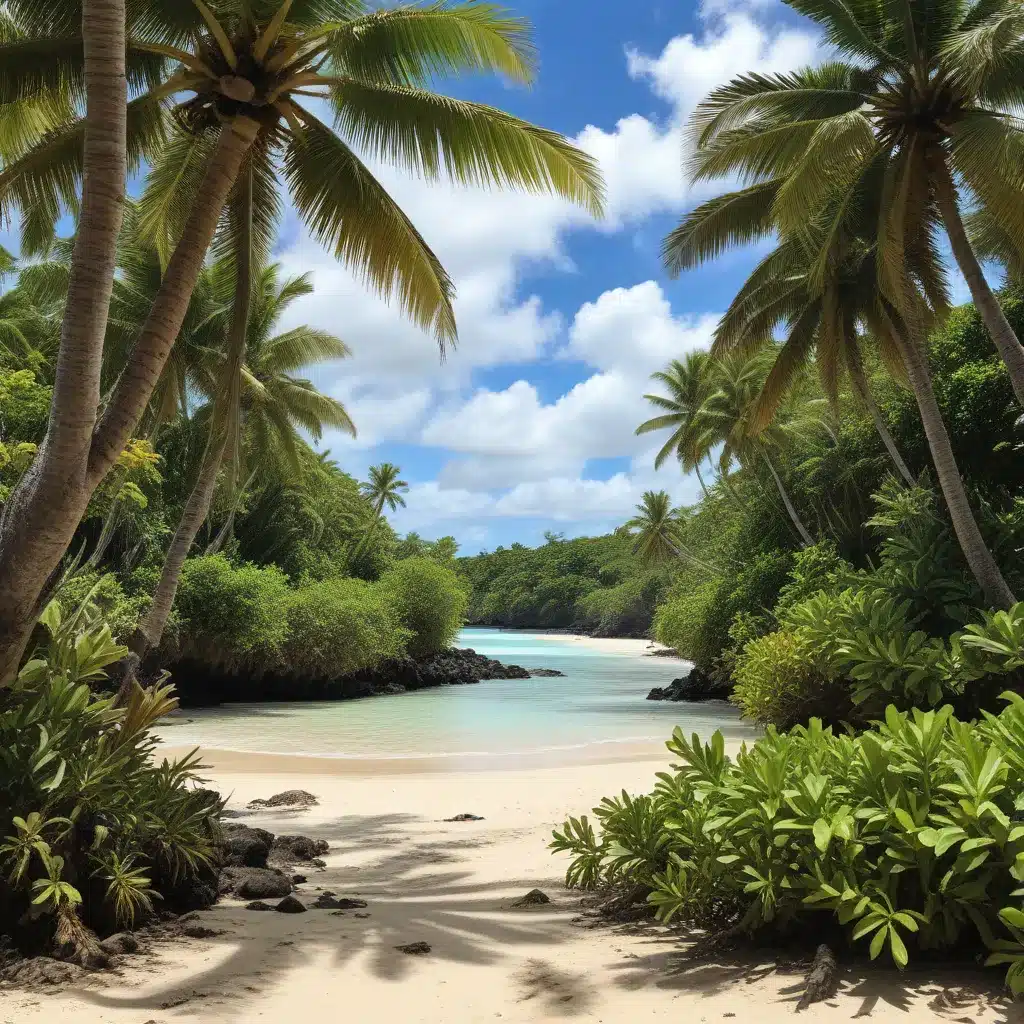
Preserving Paradise: The Cook Islands’ Sustainable Approach to Resource Stewardship
As a seasoned cultural historian and curator, I’m honored to delve into the remarkable story of the Cook Islands’ sustainable resource management practices. This island nation, nestled in the heart of the South Pacific, has long been a shining example of how traditional knowledge, collective action, and innovative policies can work in harmony to safeguard fragile ecosystems and ensure the well-being of island communities.
Navigating the Atolls’ Ecological Challenges
The Cook Islands, comprising 15 unique atolls and islands, present a diverse array of environmental challenges and opportunities. From the lush, volcanic landscapes of Rarotonga to the remote, low-lying coral atolls of Manihiki and Rakahanga, the islands have long grappled with the delicate balance of resource utilization and preservation.
Groundbreaking Research on Atoll Sustainability
Recent groundbreaking research, such as the study published in the journal Sustainability, has shed light on the remarkable resilience and adaptability of the Cook Islands’ inhabitants. Cramb and Thompson’s 2022 study examines the socioecological changes that have occurred on the atolls of Manihiki and Rakahanga, tracing the islands’ histories from their initial colonization around AD 1200-1400 to the sustained European contact in the mid-1800s.
The findings reveal a remarkable story of collective action-based processes, where the islanders transformed their landscapes, developed cyclical mass migration patterns to ensure sustainable resource use, and implemented a unique dual-chiefdom political system to address the specific social and ecological challenges they faced. This adaptive capacity, rooted in traditional knowledge and institutional innovation, has allowed the Cook Islands to maintain the sustainability of their populations in the face of ongoing climatic and social changes.
Integrated Water Resource Management
One of the hallmarks of the Cook Islands’ sustainable resource management approach is its comprehensive water policy and integrated water resource management (IWRM) framework. The Cook Islands National Water Policy, adopted in 2017, outlines a holistic strategy for ensuring the country’s water security and promoting equitable, sustainable, and resilient water use.
This policy emphasizes the importance of traditional knowledge, community engagement, and cross-sectoral collaboration in addressing the islands’ unique water challenges. From rainwater harvesting and groundwater management to the protection of watersheds and the mitigation of water-related disasters, the Cook Islands’ IWRM approach serves as a model for other small island developing states (SIDS) grappling with the impacts of climate change and resource scarcity.
Empowering Local Communities
At the heart of the Cook Islands’ sustainable resource management efforts is a deep respect for the knowledge and stewardship of local communities. The islands’ traditional resource management systems, often rooted in cultural practices and customary land tenure arrangements, have played a crucial role in preserving the delicate balance of their ecosystems.
Through initiatives like the establishment of rāui (temporary bans on resource use) and the involvement of traditional leaders in decision-making processes, the Cook Islands have been able to adapt their resource management strategies to the unique needs and circumstances of each island community. This community-centric approach has fostered a strong sense of ownership and responsibility among the islands’ inhabitants, ensuring the long-term sustainability of their natural resources.
Promoting Sustainable Tourism
As the Cook Islands have embraced eco-tourism as a vital component of their economic development, the country has also taken steps to ensure that this industry aligns with its broader sustainability goals. The Cook Islands Sustainable Tourism Policy, for example, outlines a comprehensive framework for promoting environmentally responsible tourism practices, supporting local communities, and preserving the islands’ rich cultural heritage.
By encouraging the use of renewable energy, the implementation of waste management strategies, and the development of community-based tourism initiatives, the Cook Islands are setting an example for other island nations seeking to balance economic growth with environmental protection and cultural preservation.
Investing in the Future: Education and Knowledge Sharing
The Cook Islands’ commitment to sustainable resource management extends to its investment in education and knowledge sharing. The islands’ cultural institutions, such as the Cook Islands Library and Museum, play a vital role in preserving and disseminating traditional ecological knowledge, while also fostering a deeper understanding of the islands’ history, art, and traditions.
Through educational programs, community workshops, and collaborative research initiatives, the Cook Islands are empowering their youth and engaging with global partners to ensure that their sustainable resource management practices are passed down to future generations. This intergenerational knowledge transfer is crucial in a rapidly changing world, where the ability to adapt and innovate is paramount to the islands’ long-term resilience.
Navigating the Path Ahead: Challenges and Opportunities
While the Cook Islands have made remarkable strides in sustainable resource management, they, like many other SIDS, continue to face a range of challenges. Rising sea levels, the increasing frequency and intensity of natural disasters, and the impacts of global economic and social trends all pose significant threats to the islands’ delicate ecosystems and the well-being of their communities.
However, the Cook Islands’ proven track record of innovation, community engagement, and adaptive capacity offers hope and inspiration for other island nations. By continuing to invest in sustainable development, strengthening cross-sectoral partnerships, and amplifying the voices of local stewards, the Cook Islands can serve as a model for the global community on how to build a more resilient and equitable future.
As a cultural historian and curator, I am honored to share the story of the Cook Islands’ sustainable resource management practices. Their remarkable achievements serve as a testament to the power of traditional knowledge, collective action, and forward-thinking policies in addressing the complex environmental and social challenges facing island communities worldwide.
I encourage visitors to the Cook Islands Library and Museum to explore the wealth of resources and exhibits that celebrate the islands’ rich cultural heritage and their innovative approach to sustainable resource stewardship. By learning from the Cook Islands’ example, we can all contribute to a more sustainable and resilient future for our planet.

